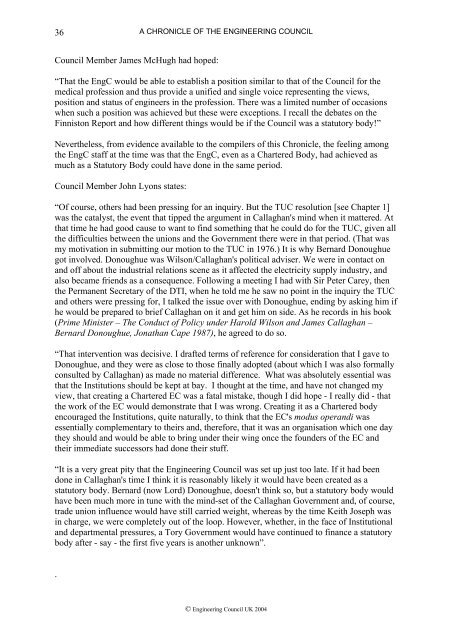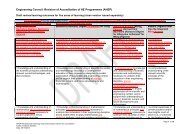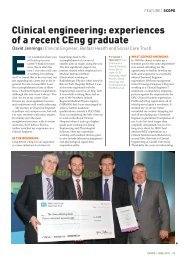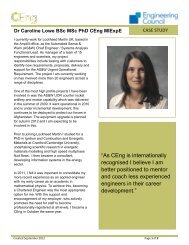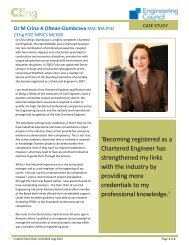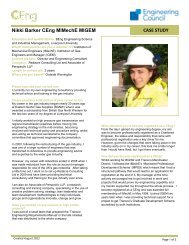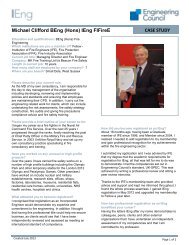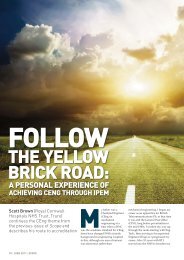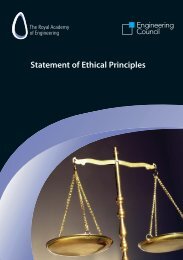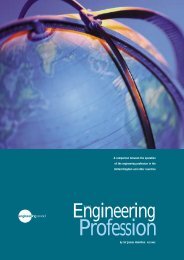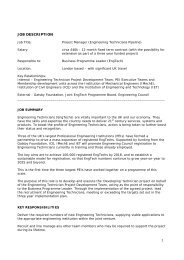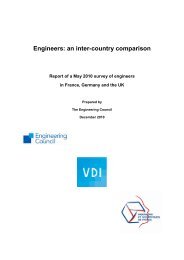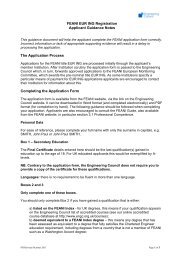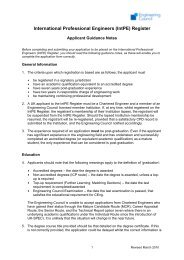An Engine for Change - A Chronicle of the Engineering Council
An Engine for Change - A Chronicle of the Engineering Council
An Engine for Change - A Chronicle of the Engineering Council
Create successful ePaper yourself
Turn your PDF publications into a flip-book with our unique Google optimized e-Paper software.
36A CHRONICLE OF THE ENGINEERING COUNCIL<strong>Council</strong> Member James McHugh had hoped:“That <strong>the</strong> EngC would be able to establish a position similar to that <strong>of</strong> <strong>the</strong> <strong>Council</strong> <strong>for</strong> <strong>the</strong>medical pr<strong>of</strong>ession and thus provide a unified and single voice representing <strong>the</strong> views,position and status <strong>of</strong> engineers in <strong>the</strong> pr<strong>of</strong>ession. There was a limited number <strong>of</strong> occasionswhen such a position was achieved but <strong>the</strong>se were exceptions. I recall <strong>the</strong> debates on <strong>the</strong>Finniston Report and how different things would be if <strong>the</strong> <strong>Council</strong> was a statutory body!”Never<strong>the</strong>less, from evidence available to <strong>the</strong> compilers <strong>of</strong> this <strong>Chronicle</strong>, <strong>the</strong> feeling among<strong>the</strong> EngC staff at <strong>the</strong> time was that <strong>the</strong> EngC, even as a Chartered Body, had achieved asmuch as a Statutory Body could have done in <strong>the</strong> same period.<strong>Council</strong> Member John Lyons states:“Of course, o<strong>the</strong>rs had been pressing <strong>for</strong> an inquiry. But <strong>the</strong> TUC resolution [see Chapter 1]was <strong>the</strong> catalyst, <strong>the</strong> event that tipped <strong>the</strong> argument in Callaghan's mind when it mattered. Atthat time he had good cause to want to find something that he could do <strong>for</strong> <strong>the</strong> TUC, given all<strong>the</strong> difficulties between <strong>the</strong> unions and <strong>the</strong> Government <strong>the</strong>re were in that period. (That wasmy motivation in submitting our motion to <strong>the</strong> TUC in 1976.) It is why Bernard Donoughuegot involved. Donoughue was Wilson/Callaghan's political adviser. We were in contact onand <strong>of</strong>f about <strong>the</strong> industrial relations scene as it affected <strong>the</strong> electricity supply industry, andalso became friends as a consequence. Following a meeting I had with Sir Peter Carey, <strong>the</strong>n<strong>the</strong> Permanent Secretary <strong>of</strong> <strong>the</strong> DTI, when he told me he saw no point in <strong>the</strong> inquiry <strong>the</strong> TUCand o<strong>the</strong>rs were pressing <strong>for</strong>, I talked <strong>the</strong> issue over with Donoughue, ending by asking him ifhe would be prepared to brief Callaghan on it and get him on side. As he records in his book(Prime Minister – The Conduct <strong>of</strong> Policy under Harold Wilson and James Callaghan –Bernard Donoughue, Jonathan Cape 1987), he agreed to do so.“That intervention was decisive. I drafted terms <strong>of</strong> reference <strong>for</strong> consideration that I gave toDonoughue, and <strong>the</strong>y were as close to those finally adopted (about which I was also <strong>for</strong>mallyconsulted by Callaghan) as made no material difference. What was absolutely essential wasthat <strong>the</strong> Institutions should be kept at bay. I thought at <strong>the</strong> time, and have not changed myview, that creating a Chartered EC was a fatal mistake, though I did hope - I really did - that<strong>the</strong> work <strong>of</strong> <strong>the</strong> EC would demonstrate that I was wrong. Creating it as a Chartered bodyencouraged <strong>the</strong> Institutions, quite naturally, to think that <strong>the</strong> EC's modus operandi wasessentially complementary to <strong>the</strong>irs and, <strong>the</strong>re<strong>for</strong>e, that it was an organisation which one day<strong>the</strong>y should and would be able to bring under <strong>the</strong>ir wing once <strong>the</strong> founders <strong>of</strong> <strong>the</strong> EC and<strong>the</strong>ir immediate successors had done <strong>the</strong>ir stuff.“It is a very great pity that <strong>the</strong> <strong>Engine</strong>ering <strong>Council</strong> was set up just too late. If it had beendone in Callaghan's time I think it is reasonably likely it would have been created as astatutory body. Bernard (now Lord) Donoughue, doesn't think so, but a statutory body wouldhave been much more in tune with <strong>the</strong> mind-set <strong>of</strong> <strong>the</strong> Callaghan Government and, <strong>of</strong> course,trade union influence would have still carried weight, whereas by <strong>the</strong> time Keith Joseph wasin charge, we were completely out <strong>of</strong> <strong>the</strong> loop. However, whe<strong>the</strong>r, in <strong>the</strong> face <strong>of</strong> Institutionaland departmental pressures, a Tory Government would have continued to finance a statutorybody after - say - <strong>the</strong> first five years is ano<strong>the</strong>r unknown”..© <strong>Engine</strong>ering <strong>Council</strong> UK 2004


